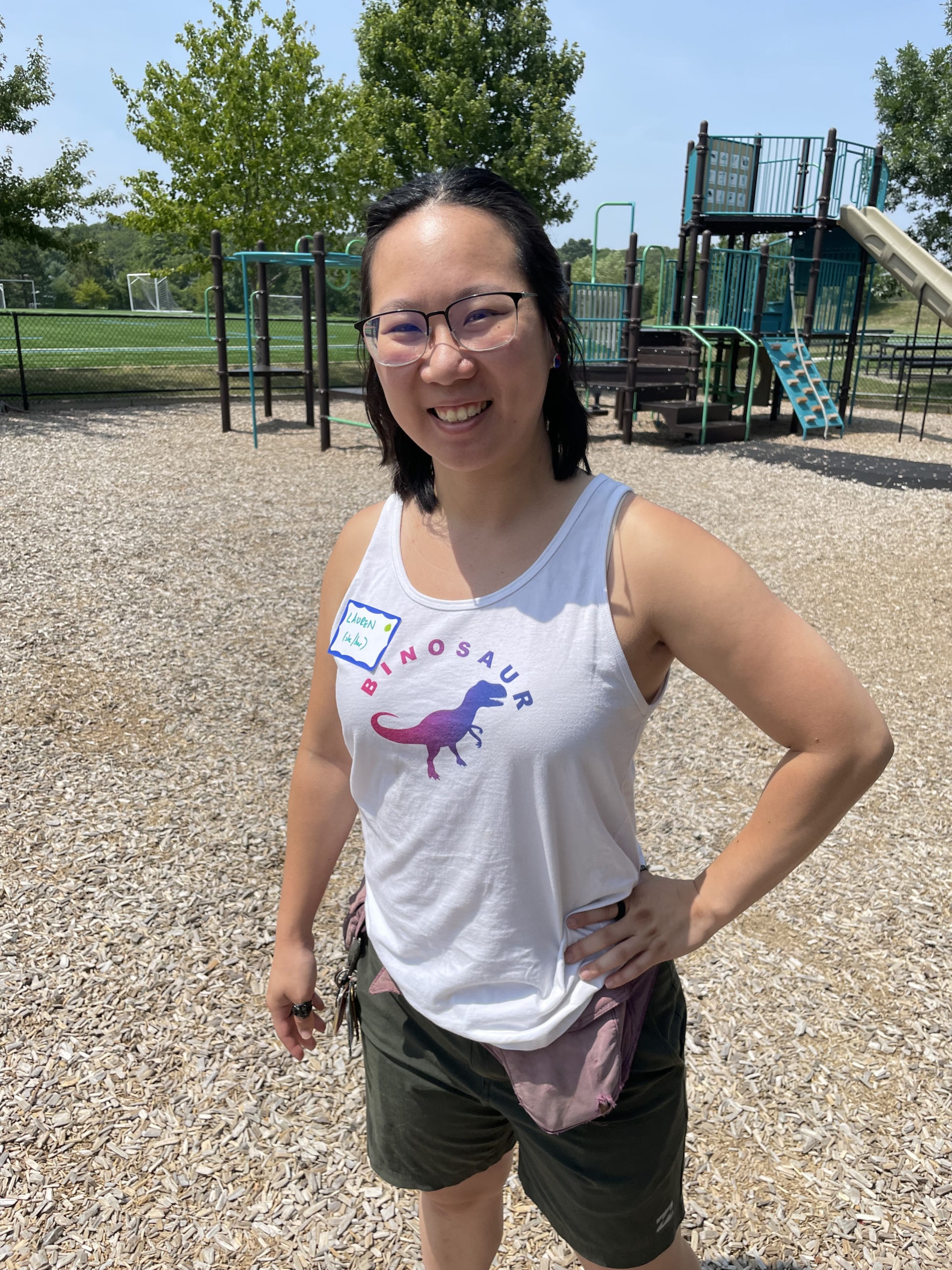
Are you wondering what mentor training is like? Perhaps you’re curious about what motivates people to join the SLM community as a volunteer mentor to a youth in foster care.
We recently sat down with newly-approved and trained mentor Lauren to learn why she wanted to become a volunteer Silver Lining mentor, what her training experience was like, and how it feels to be a part of the SLM community. Lauren is a customer success manager at longtime SLM partner and Match Gala sponsor Wistia, with a passion for the arts, movies, and Dungeons & Dragons. She lives with her partner and cats in North Cambridge.
How did you learn about Silver Lining Mentoring?
I work at Wistia, which has partnered with Silver Lighting Mentoring for several years longer than I’ve been around at Wistia. A year and a half ago, our head of DEI, posted in our team channel, specifically our queer-focused ERG group, and said, “Hi, we partner with this organization, and they are looking for speakers to be at their Learn and Earn panel. Who would be interested?” It was a one-night commitment, and it sounded like a really great mission.
Seeing some of the overlap between ways that I identify, the people that were going to be helped by this, and as someone who has recently and is still on the financial confidence journey, I was like, “This is relatable! Yes, I will come and help!”
What inspired you to become a Silver Lining mentor?
I attended Match Gala this year, and it was a wonderful evening. It put mentoring again at the forefront of my mind: “Hey, you could do this.”
I think one of the other things is that the current socio-political climate hasn’t gotten better, and I think for the past several years, even before I had heard of Silver Lining Mentoring, I was really struggling to figure out how I wanted to give back and increase my social impact. But I wasn’t sure how to go about it.
Having benefited from similar relationships in my life, I felt like the stars came together to shine a light that this was a good way to have a social impact.
What role has mentoring played in your life?
The mentors that I’ve had in my life have given me confidence. I still keep in touch with my boss for my very first job. Maybe a little bit under a year ago, I was panicking because I thought I had to make a career decision. I suddenly felt like I needed to decide right now. My mentor got on the phone with me, and she was really able to help externalize what had been a very internal conversation.
She asked, “Okay, what are you afraid of?” We broke it down further from there, and that was incredibly helpful. Support circles give you a place to fall back to if something goes wrong.
If you don’t have that, then you can’t make choices that are as bold. You can’t take as many risks, because you have to be able to pick yourself back up.
What if anything surprised you about mentor training?
I think there were two things. I was really pleasantly surprised by how much SLM advocated for clear boundaries with a mentee. I think I tend, especially in a close interpersonal relationship, to want to give.
In a situation like this, where you’re cultivating a relationship where you want to be available, you want to be consistent, it was a surprise to hear how important boundaries are, and yet it also made a ton of sense. Because in order to be consistent and reliable, you need to set a boundary that is sustainable for you – emotionally, financially, and time-wise.
The other thing that surprised me was that I realized I might be more prepared than I gave myself credit for. For example, there was a module that covered some basic vocabulary on queer communities, trans, gender-nonconforming, and I was like, “I know about this! Great!” And some people are not as exposed to those communities. Some people may not either have lived or adjacent lived experience with a lot of those communities, and it reminded me that I am not a blank slate and that my lived experiences are relevant.
How has mentor training prepared you to be a Silver Lining mentor? Is there anything in particular that you’re grateful you learned?
I think the biggest thing I’m grateful for is the program coordinator relationship. Having that gives me the confidence that I will be able to play the mentor role safely and well. The training made it very clear in general that there are additional resources and that the learning doesn’t end with the initial training. That was incredibly helpful in validating that you don’t need to know everything you’re ever going to need to know today.
As you wait to be matched with a young person in foster care, what are you feeling?
It reminds me of going to a new school. I feel very giddy and nervous.
I am also feeling a sense of anticipation of who my mentee will be and whether we will hit it off. Mostly I’m trying to remember to be myself and trust the process.
As you know, SLM asks mentors to make at least a one-year commitment to their mentee. After your first year together, how do you hope your mentee will describe you?
I hope that they would describe me as someone who is very supportive, but also someone who’s not going to patronize them just because they’re younger. Someone who’s going to meet them where they are. Someone who can acknowledge when things suck, empathize, and also provide accountability and support when they may need to talk through different ways to handle a situation. I would hope that they’re like, “Yeah, Lauren treats me like a person.”
What has it felt like to join the Silver Lining Mentoring community?
Everyone has been so welcoming. I think being at Community Day I was really grateful to meet a lot of people at different phases of their mentoring journey. I’m so glad that I went. I think it made everything a lot more real. I was like, “Everyone’s a real person!”
I’m excited to see more, and learn more, and be able to participate even more fully. I look forward to being in the reverse situation and talking to someone who’s brand new, and being like, “Hey! It’s weird, and you’re gonna be anxious, and that’s cool. It’s the onstage jitters, right before curtain. Break a leg!”
Interested in learning more about mentoring a young person in foster care? Check out the Become a Mentor page and explore options for attending an upcoming volunteer info session.

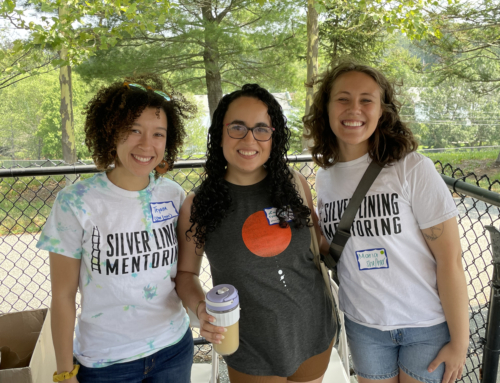
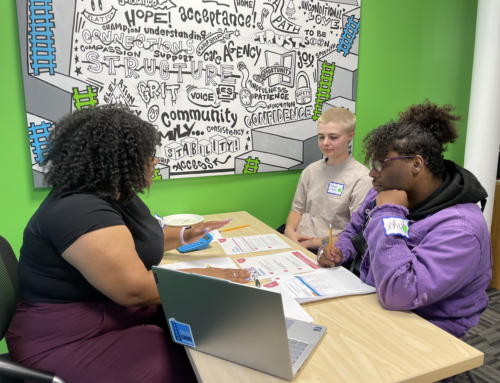


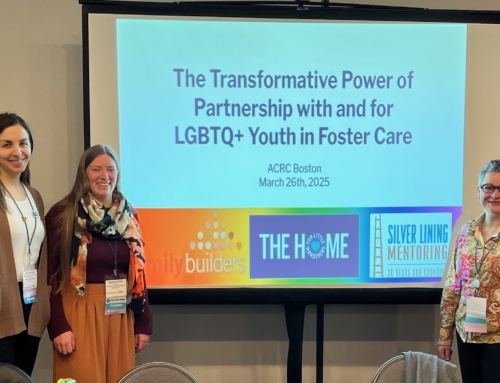
Leave A Comment